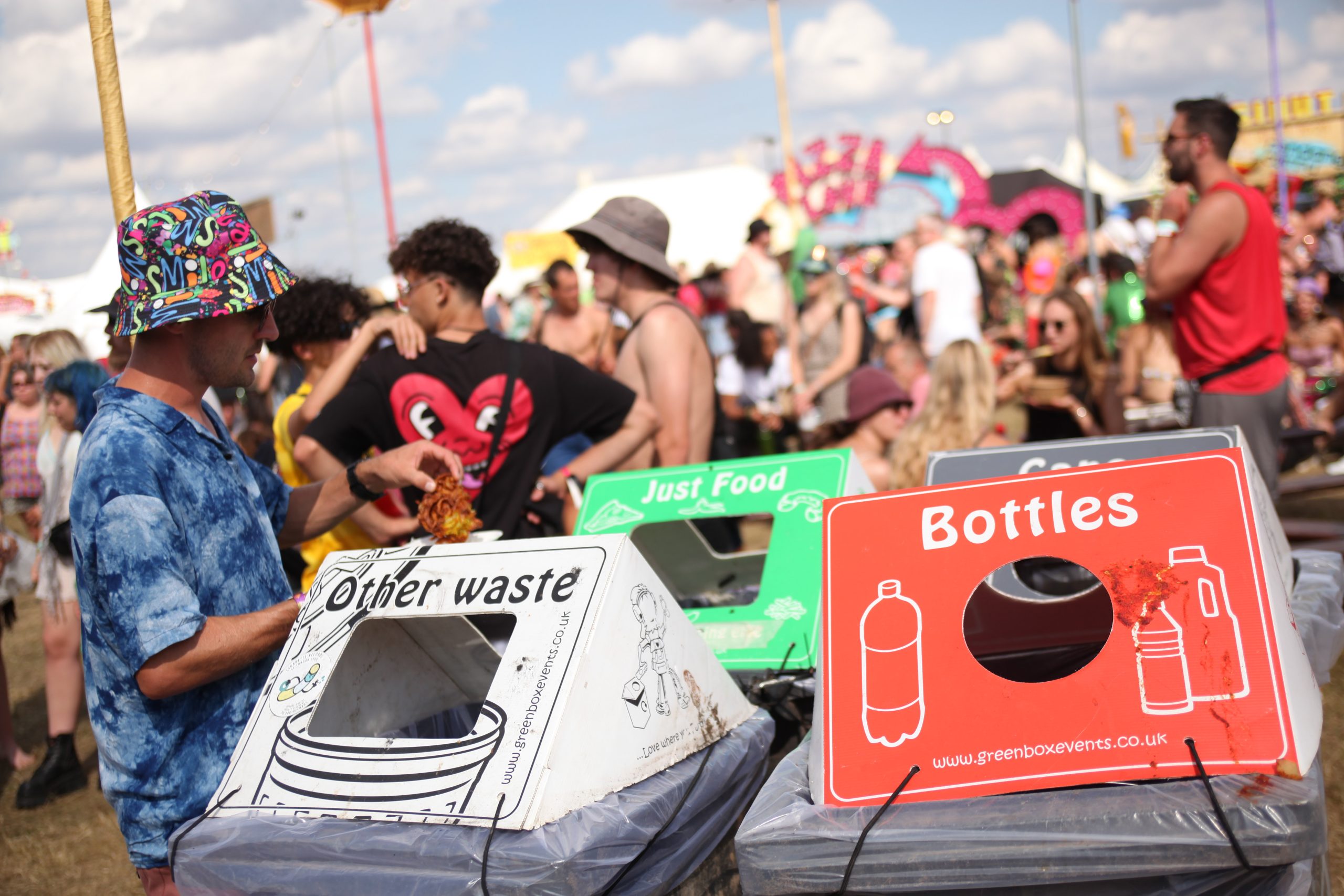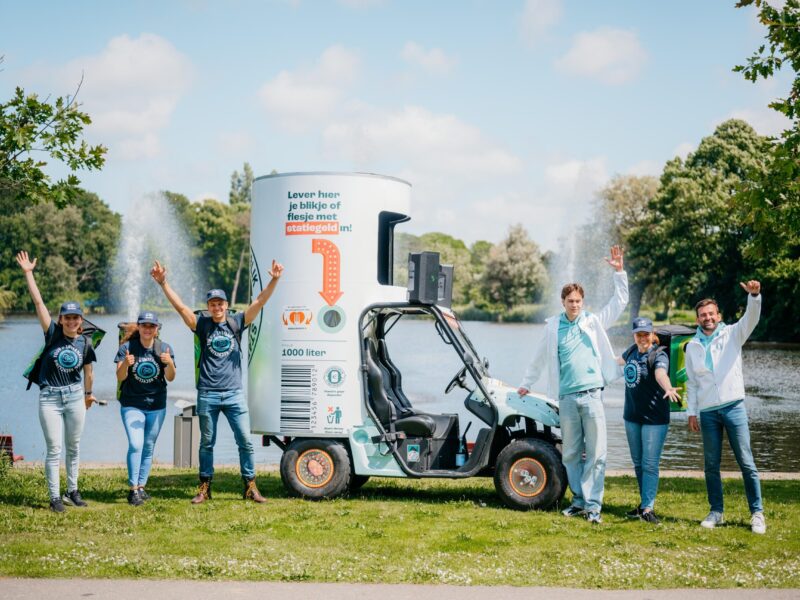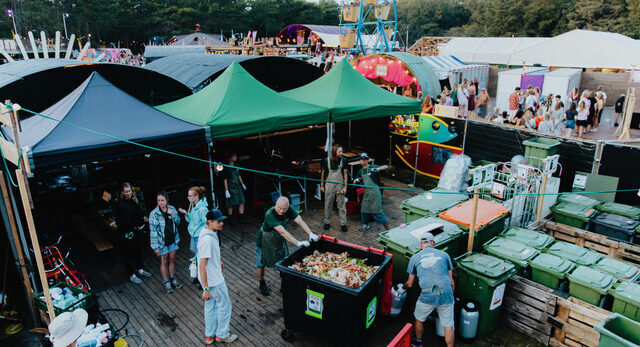
Vision 2025’s Chris Johnson on why a materials policy is key to sustainable waste management
This article was originally published via Stand Out and can be found here.
As the summer festival season draws to a close, and many events start to plan for next year’s events, Vision 2025 chair Chris Johnson makes the case for thinking about materials at the very outset of planning and provides a round-up of free-to-use resources which support organisers wishing to manage materials and waste more sustainably…
Waste has been voted in the top three sustainability challenges in the Industry Green Survey year after year. We’ve all seen the waste hierarchy, and it’s easy enough to know what practices we are aiming for – reducing material use, reducing waste, recycling more, separating and composting food waste etc. But it’s often a challenge to achieve this on the ground. This is due to a myriad of factors, such as the large number of stakeholders involved in managing materials, the inconsistency of what waste processing facilities can and will take from events, and audience behaviour, amongst others.
The Zero Waste Festival Project, a collaboration overseen by the festival industry’s Waste Task Force – a group of environmental organisations, experts and suppliers – has been researching waste and developing resources over the past three years. One of the key factors it identified is that thinking about materials at the very outset of event planning, before any contracts are agreed, and before anything is purchased, is vital to success. However obvious this may seem, it’s not yet common practice. Putting in place a materials policy can guide the entire approach to materials across all stakeholders, ensuring that the organisation buys responsibly and is in control of what materials are on a site and become waste.
The research also highlighted a useful principle; the fewer types of materials on an event site, the easier it is to communicate, enforce, manage and collect, and match the materials to an end-of-life process. This relies on clear and strict policy at the outset and good communication, but also that the policy is reverse engineered to what can realistically be done with the waste post-event. It’s frustrating that a universal approach can’t work in the UK due to a tapestry of different waste processing options regionally, and so event organisers need to find out what the options are for themselves, or via a trusted contractor. Event organisers who have visited their waste facilities tend to report that it’s somewhat of a revelation, to really understand what happens – it makes it real somehow.
This feeds into a second, inconvenient principle; that managing materials must be done well to be successful. Getting it “mostly right” doesn’t deliver results, as small levels of contamination in recyclable or compostable materials lead to whole consignments being rejected by processing facilities, often resulting in no recycling. So, we come a full circle, back to the importance of the materials policy, and getting it right at the outset. Everyone needs to know about it, and no one, including sponsors, can be allowed to introduce materials into the event’s ecosystem that are outside the policy or unexpected.
The challenge then is to create a culture of compliance, in which there are incentives and disincentives to adhering to materials policy, and using the collection systems on site, front of house and back of house. We all know what these are: Clearly labelled bin systems (an art in itself, and typically poorly done at most events, and with little national consistency – an issue for another time), and clear and enforced expectations for traders, bars and other stakeholders onsite.
TOOLKIT
A key resource is the Sustainable Materials and Waste Toolkit which provides practical step-by-step guidance and resources for those managing procurement and waste at greenfield festivals, including practical checklists to monitor and review actions being taken, templates for developing policies and other documents specific to your festival, and guidance on specific elements of waste management.
The toolkit is structured around ten steps; each step details actions to be taken and links to the relevant resources, with references, to guide festivals throughout the process of managing waste, with advice on using the right resources at the right times. Festivals can download the individual resources as separate documents online or download the whole toolkit as a folder containing all relevant resources to use when needed. The templates (e.g. materials list template) are designed as a starting point for creating each festival’s specific version.
TOWARDS ZERO WASTE
The Towards Zero Waste project research found that professionals in procurement, site management and production were [are] often not experts in sustainable materials or the plethora of regulations that have been recently introduced. In the past few years particularly, there have been several changes to waste regulations that affect how events manage materials such as plastics, furniture, and vapes (electronic waste). In addition, the Green Claims Code has come into force, which provides clear restrictions on how companies talk about their sustainable achievements. All this is covered in the Festival Industry Materials and Waste Briefing.
For those keen to really get under the bonnet of sustainable waste management at live events, the Towards Zero Waste Festivals project published a detailed guide that underpinned the development of the above toolkit and industry briefing. Resource Futures, a national waste and resources consultancy, was commissioned in 2022 by Vision 2025 and Julie’s Bicycle to help understand the challenges and opportunities for sustainable waste management at UK greenfield festivals and provide solutions-focused recommendations for events and the industry. The Towards Zero Waste Festivals: Overcoming Current Challenges in Sustainable Waste Management at UK Greenfield Events report is the result of a literature review, in-depth stakeholder interviews, specialist knowledge from Resource Futures, and input from an industry working group, and helps to provide context for the challenges event organisers experience in their every day, and inspiration for a wide range of solutions.
RESOURCES
Another way event professionals can quickly gain knowledge of sustainable waste practices is by taking the Future Festival Tools (FFT) eLearning module. The FFT is a user-friendly free-to-access, bitesize online eLearning course covering all aspects of sustainable event management.
More recently, a new report by Material Focus, Vapes and Electricals – Briefing for festivals and events has been published to help event organisers understand how to deal with vapes and electrical waste, covering subjects such as working with audiences and disposal. All of these resources, and more, can be found on the Vison:2025 Resources Hub by selecting “waste” as a category in the theme dropdown.






